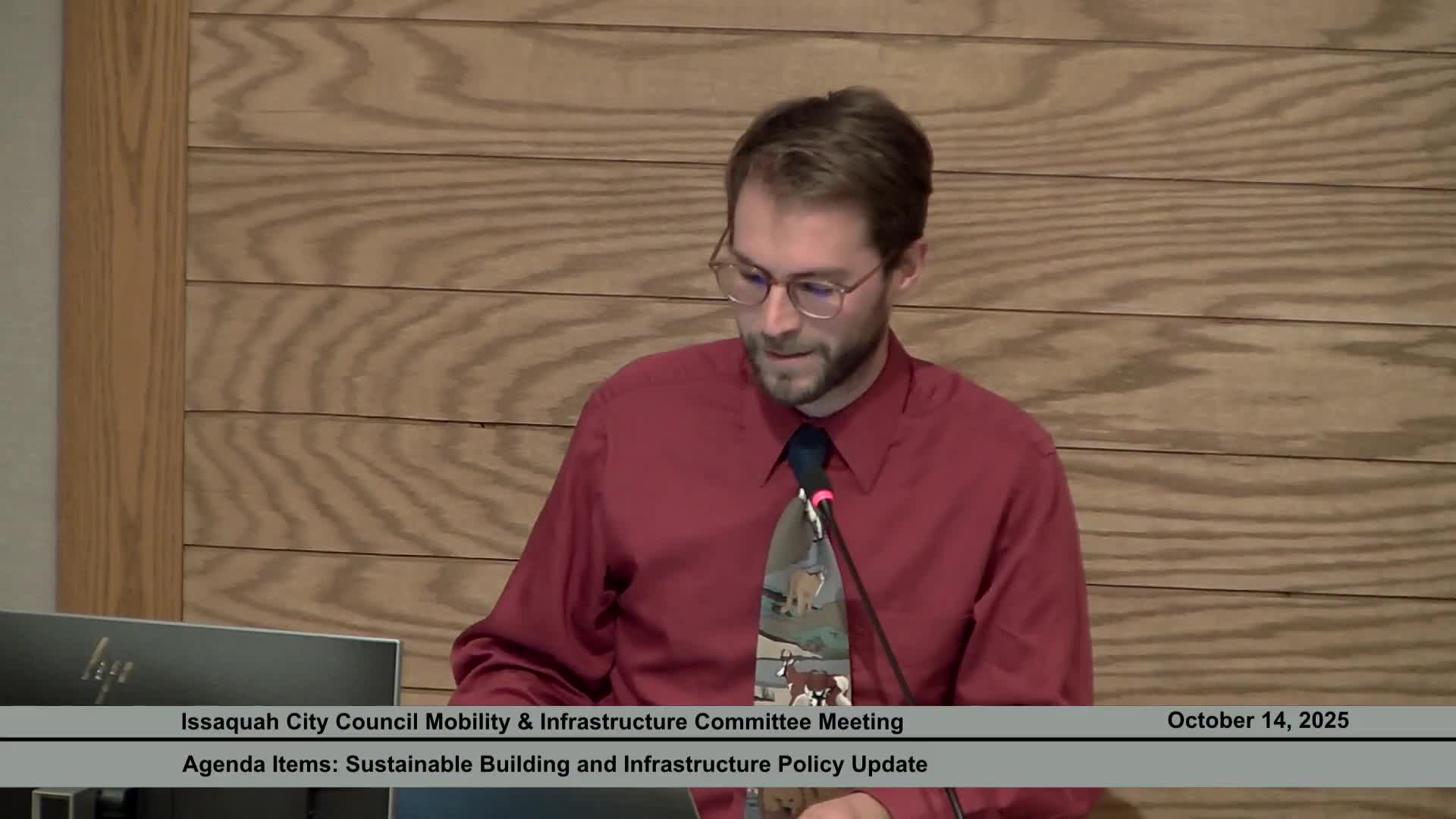Issaquah committee favors phased sustainable building policy; staff recommends Envision pilots and staff training
Get AI-powered insights, summaries, and transcripts
Subscribe
Summary
David Reedy, Issaquah’s sustainability coordinator, presented Oct. 14 proposed updates to the city’s Sustainable Building and Infrastructure Policy recommending a phased rollout that pilots the Envision infrastructure evaluation toolkit in 2026–27, strengthens staff training and builds in periodic evaluations.
David Reedy, the city’s sustainability coordinator, presented proposed updates to Issaquah’s 2004 Sustainable Building and Infrastructure Policy at the Mobility and Infrastructure Committee meeting Oct. 14. The administration recommended a phased approach: pilot the Envision toolkit on infrastructure projects first (2026–27), build staff capacity and training, and evaluate results in 2028 before broad application across city capital projects.
Reedy said the updated policy is intended to incorporate sustainability principles across city building and infrastructure projects and to align municipal facility requirements with existing code where appropriate. He told the committee buildings operated by the city accounted for roughly 48% of government operations greenhouse gas emissions in 2022 and said the update implements Sustainable Building Action Strategy and the 2021 Climate Action Plan recommendations.
Key recommendations presented by staff include: - Pilot Envision for infrastructure projects: staff recommended selecting one or more pilot projects in 2026 to test Envision’s applicability to roads, parks and other nonbuilding capital projects; pilots would inform whether a certification target (verified/silver/gold/platinum) should be required citywide. - Certification approach: for medium-size facilities (about 5,010 sq ft and larger) staff propose aligning guidance with LEED Platinum standards but not mandating formal LEED certification to control cost and maintain flexibility; large projects would follow existing land-use code requirements that currently target LEED Platinum and require certification. - Electrification feasibility: the policy would require electrification feasibility assessments when replacing fossil-fuel equipment, modeled on Pierce County’s Electric First approach. - Waste diversion and source separation: new language sets construction and demolition diversion goals, a three-year rotating waste audit for city facilities, and mandates waste reduction and source separation practices.
Reedy said Cascadia Consulting worked with staff in 2024–25 to prepare the recommendations, which included interviews with peer jurisdictions and the environmental board. The environmental board reviewed the draft in September and October and approved the policy update for committee review while asking staff to strengthen infrastructure-specific requirements and to clarify evaluation steps and timelines. Reedy said the administration incorporated four of the environmental board’s requested changes, including clearer action steps and reorganized text to show which sections apply to buildings, infrastructure, or both.
Staffing, grants and pilot structure: Stacy Van McKinstry, sustainability manager, told the committee that state and regional grant opportunities generally remain available but staff had not yet identified a specific grant for Envision-related upgrades; identifying grants will be part of the pilot evaluation. Reedy and Van McKinstry recommended staff training on Envision and LEED before making any citywide mandate because Issaquah currently lacks staff certified in Envision implementation.
Committee feedback: Committee members broadly supported the pilot approach. Deputy Council President DeMichele said pilots are appropriate to build capacity and learn costs and impacts. Council Member Ray recommended a hybrid approach: set a preliminary target (for example, LEED Platinum/Envision goal) but use pilots to “true up” the target; he also urged pilots be structured with clear objectives and recommended robust community outreach. Council members asked staff to return to the environmental board with final wording and to prepare for council consideration in November with adoption expected thereafter.
Next steps and timing: If the committee’s recommendation proceeds, staff said the policy will go to full City Council in November for consideration. Staff plan to identify infrastructure pilot project(s) in 2026, implement pilots 2026–27, evaluate results in 2028 (and again in 2030/2031 as the update includes periodic evaluation), and incorporate learnings into the 2027 capital improvement plan and future budget development. Reedy said staff will seek grant and incentive funding to offset costs and will coordinate pilot selection with Public Works, Parks and Administrative Services to test Envision across project types.
